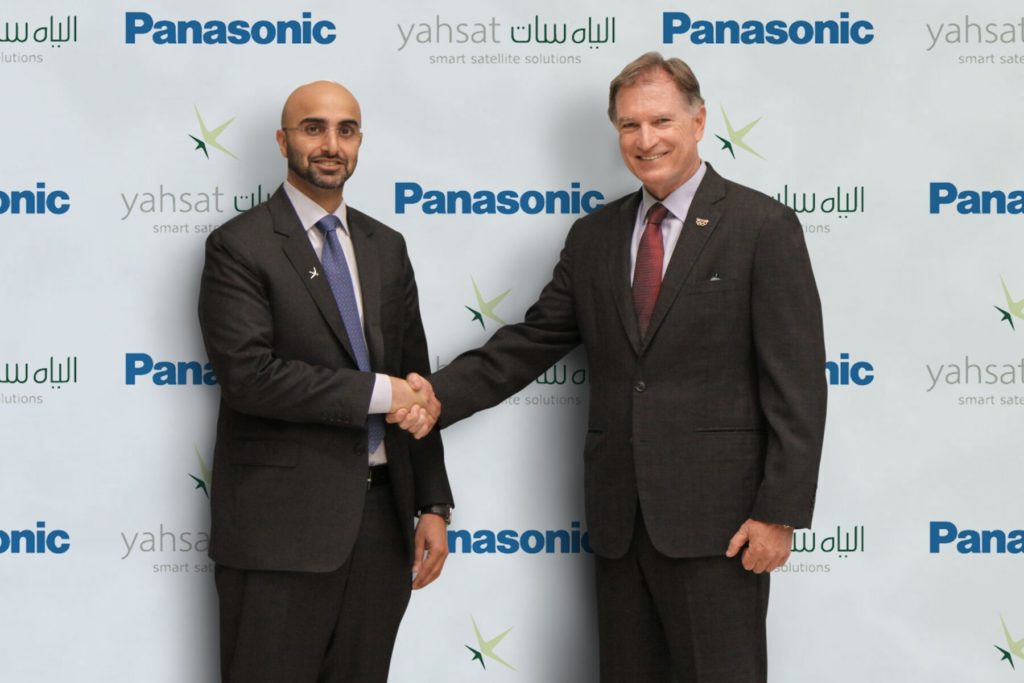Latest News

Masood Mahmood, CEO of Yahsat (left), and Paul Margis, president and CEO of Panasonic Avionics (right). Photo: Yahsat
[Via Satellite 09-07-2016] Yahsat, the Middle East satellite operator, hopes its recent deal with Panasonic Avionics will give it greater scope to make its presence felt in the mobility market. This was an important deal for the company as it looks to markets like aviation to grow revenues. Masood Mahmood, Yahsat’s CEO told Via Satellite, “Yahsat is ideally placed to provide flexible solutions for companies that need connectivity in the skies, at sea or in remote locations. Similarly, Panasonic Avionics is the world’s leading supplier of inflight entertainment and communication systems; as such collaborating together to develop a global benchmark in In-Flight Connectivity (IFC) was a natural step for us.”
However, while Yahsat’s major focus is on the Middle East, the deal with Panasonic could open it up to other markets. Yahsat has made no secret of its aspirations to become a stronger player in markets like Latin America. Mahmood sees this collaboration as an “international growth opportunity.”
“With Panasonic Avionics’ global network of clients and partners, and Yahsat’s current and future footprint, we anticipate that the solutions we develop jointly will be global in nature. This would also allow us to have consistent service for passengers across their entire flight,” he said.
Mahmood expects IFC to become an important part of Yahsat’s business alongside other diverse business sectors including energy, healthcare and financial services, in addition to countries requiring connectivity for remote, unserved and underserviced areas.
“We anticipate that IFC services will be an increasingly important differentiator for airlines as they compete in a fiercely competitive global market place,” he said. “The potential of this partnership, as we explore the opportunity to launch a Yahsat satellite constellation that would serve Panasonic’s general mobility needs, reaches beyond simply the scope of airlines and aircrafts. We expect the solutions we develop with Panasonic to serve aviation. While the economies of true broadband global inflight connectivity are difficult to justify today, we believe that this is an important area of growth that we can utilize synergies with our existing business to make the case possible.”
This is not first major announcement that Yahsat has made in terms of IFC. Last year, the company revealed plans to test high-speed inflight satellite connectivity using an Etihad Airways A320 aircraft. It was a significant collaboration for Yahsat.
“Our Ka-band capacity provides higher speeds and cheaper rates compared to legacy inflight connectivity systems based on Ku-band, which will result in faster and more reliable connection,” said Mahmood. “Yahsat is always open to exploring new partnerships to develop new technologies that will solve connectivity challenges across the globe. The Middle East has become a logistics hub for some of the leading global airlines, and being based in this region can give us an advantage in terms of getting some of these partnership discussions going.”
Yahsat believes the IFC market is evidently big enough to support a number of different players. Mahmood highlighted some recent research where a company called Visiongain assessed that the connected aircraft market is valued at $2.2 billion in 2016 and is set to grow exponentially in the coming five to 10 years, with this being due to an increase in demand from Wi-Fi enabled devices.
“As a result, there is a huge opportunity for companies such as Yahsat to provide vital connectivity links to airlines, enabling them to provide high-speed reliable satellite broadband Internet,” Mahmood added.
Get the latest Via Satellite news!
Subscribe Now